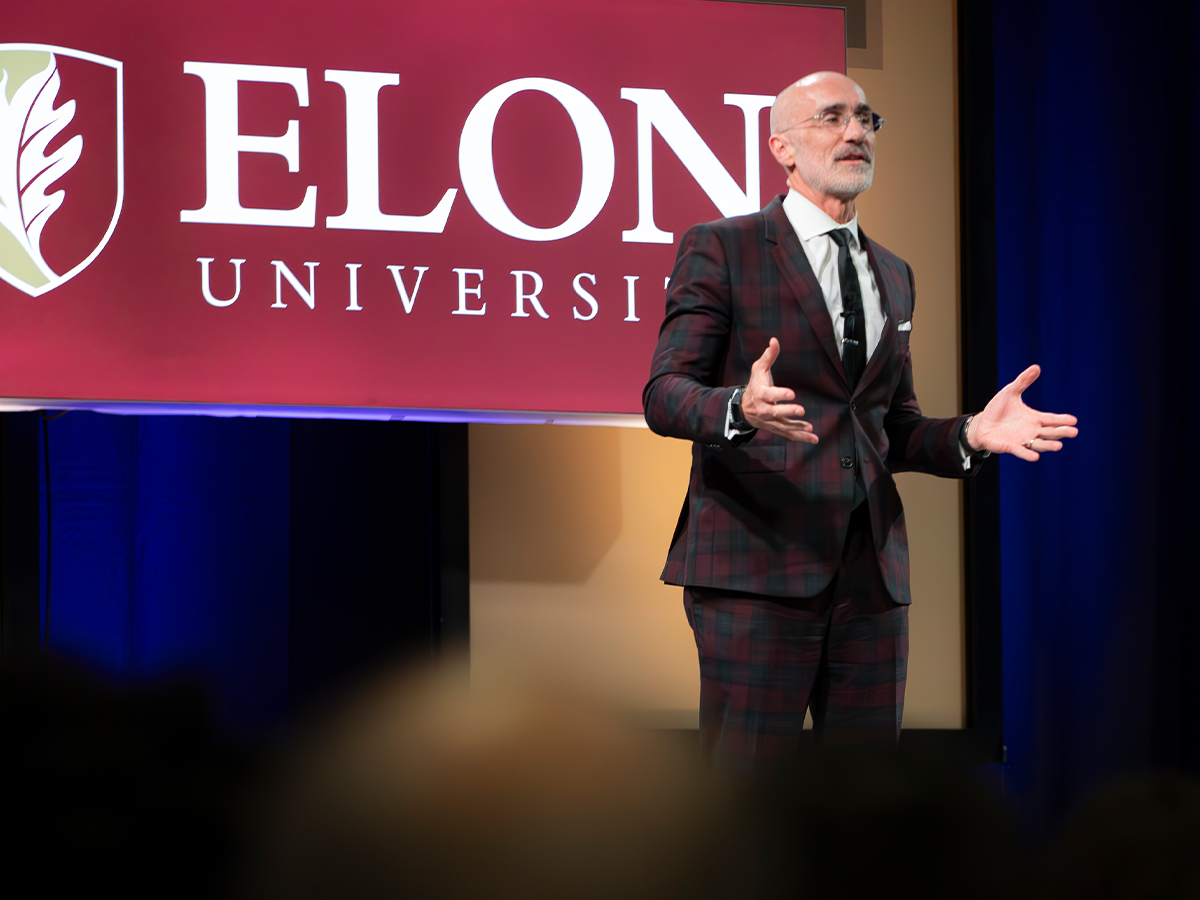Harvard professor, social scientist and best-selling author Arthur C. Brooks offered his "habits for happiness" during the 2024 Fall Convocation on Sept. 27.
As students and families gathered in Alumni Gym on Friday, Sept. 27, for Fall Convocation during Family Weekend, they were already practicing one of speaker Arthur C. Brooks’ four “habits for happiness” — family.
“It’s a good start that you’re here,” said Brooks, to laughter from the audience. “But here’s one of the problems that I often see, especially for students at universities: They get into a pattern that separates them inadvertently from their families.”
Fall Convocation was a highlight during a full schedule for Family Weekend that brought thousands to campus for a wide variety of events highlighting academics, athletics, performances, community and the Elon experience.
Don’t deny oxytocin
During his Friday address, Brooks argued that family connections are crucial for becoming happier, noting that people experience a release of the hormone oxytocin when they have contact with their loved ones, particularly parents of a newborn child.
“For those of you who are students, that’s how your parents are going to feel every time you come home,” said Brooks. “Come Thanksgiving when you come home for the first time, they’re going to look at you like you were born again and there’s going to be oxytocin in their brains. Don’t deny your parents that oxytocin.”
Vocal Scholar Ella Nagel ’25 opened Fall Convocation with the singing of the national anthem followed by a welcome from President Connie Ledoux Book. Student Government Association President Taylor Cote ’25 introduced Brooks, who is an acclaimed Harvard professor, social scientist and columnist for The Atlantic. Brooks has authored 13 books including the 2023 No. 1 New York Times bestseller “Build the Life You Want: The Art and Science of Getting Happier” with co-author Oprah Winfrey, and the 2022 No. 1 New York Times bestseller “From Strength to Strength: Finding Success, Happiness, and Deep Purpose in the Second Half of Life.”
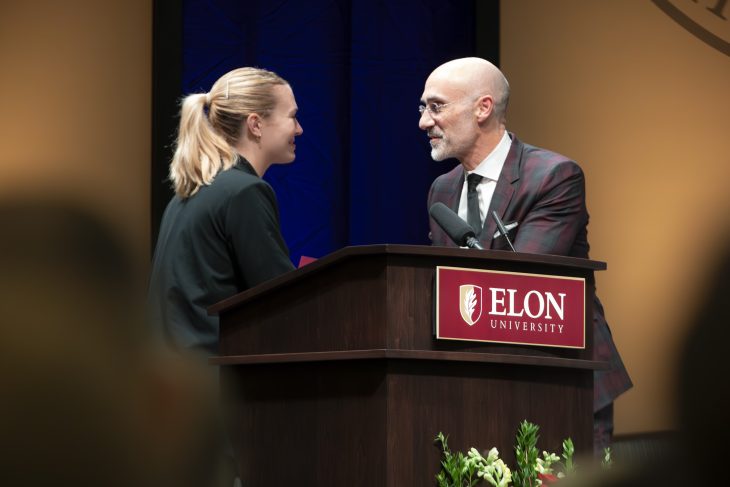
“Happier-ness”
Brooks’ advice to the audience focused not on finding happiness, but on being happier, or as his co-author Oprah Winfrey described it to him, “happier-ness.”
“You’re not going to feel bliss with no negative emotions. You need negative emotions to stay safe and alive,” Brooks said. “Perfect happiness, before you get to heaven, is not possible, but you can get happier.”
In addition to family, Brooks spoke of three other “habits for happiness” that everyone, including college students, can follow: faith, friendship and work. With faith, Brooks noted he is Catholic but that his path to happiness is not everyone else’s.
“What faith means in this context is to have a transcendental approach to life where you get small and the universe gets large,” said Brooks.
Brooks encouraged students and families to “zoom out” and think about things beyond themselves.
“Happiness is your responsibility and, to do that, you need to stand up to your natural tendencies from time to time,” he said.
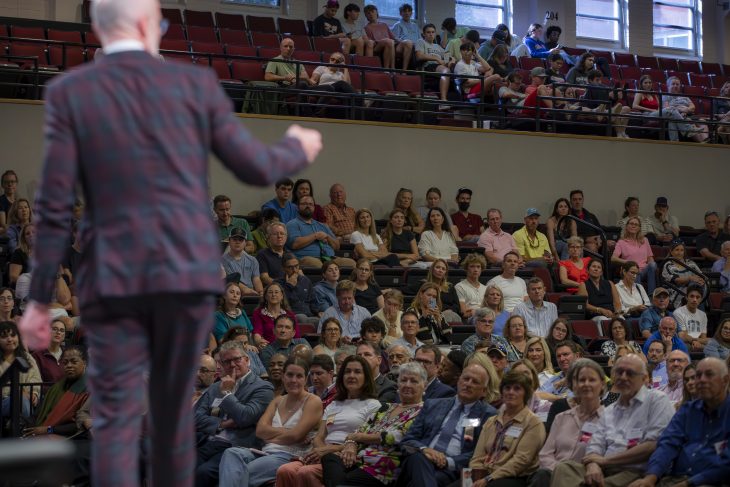
To be needed matters
When it comes to friendship, Brooks emphasized doing the work to maintain friendships and hopefully avoid what he described as the “loneliness crisis” gripping the world.
“New students are going to establish the relationships that can be, that should be, (…) the real friendships that will last you the rest of your life. It’s important to do that. Don’t let that fail,” said Brooks.
Brooks’ fourth “habit for happiness” is work, but not about earning money, power or prestige. Instead, Brooks says only “earning your success” and “serving others” affect happiness.
“You have to do something where you’re needed by other people,” Brooks said. “The essence of having dignity, the essence of avoiding despair is to be needed by other people. The saddest thing that can happen to you is to be unnecessary, to be superfluous. To be needed matters.”
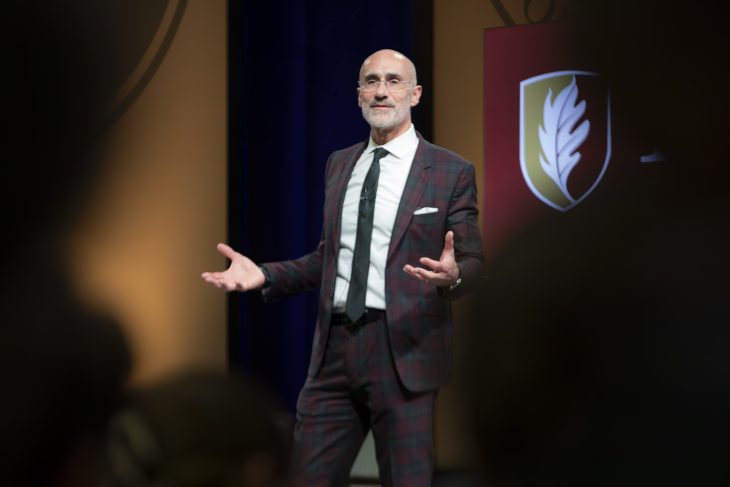
Live by example
Following his address, Brooks sat down for a Q&A with the Rev. Kirstin Boswell, university chaplain and dean of multifaith engagement, with pre-recorded video questions from students and parents.
“As our youngest daughter is a young adult, how can we instill in her balance and finding purpose?” asked Amy Maguire P’25 in a pre-recorded question for Brooks.
Brooks noted that you can’t make anybody happier and you don’t want “perfectly happy” children, but it’s important for parents to live by example.
“All they care about and all they respond to is what they see. This is true when they’re little, it’s true when they’re big,” said Brooks. “The best way for you to help your kids is being the person you want them to be.”
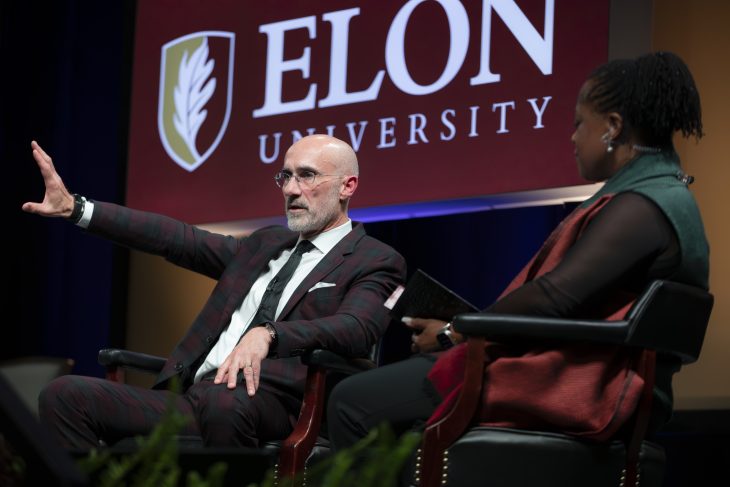
Happiness is love
But throughout all four of his “habits for happiness” and advice, Brooks argued that they come down to one thing: love.
“Happiness is love. Love of the divine, love of your family, love of your friends, and love that you express for the whole world in the excellence that you bring to the way that you earn your daily bread,” said Brooks. “Love of the world, to love others, to love yourself and your family, that’s the secret to becoming happier.”
And with the knowledge from his advice, Brooks encouraged students and families to go out themselves and become “happiness professors.”
“I need a movement. I need an army of people that wants to teach this to everybody that they possibly can,” he said. “Go get the resources or any others that you can find and dedicate yourself to teaching these ideas. The reason I’m the happiness professor is because it makes me happy.”



